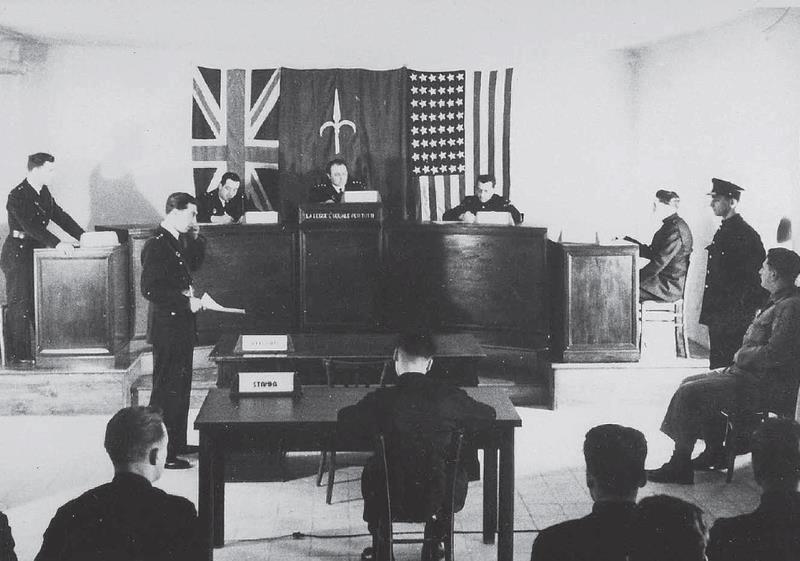
Court of Trieste during the British-US administration.
Trieste, March 27th, 2013. In the past months, the legal battle for the rights of the people of the Free State of Trieste intensified. It did with lawsuits regarding taxation, but also in criminal and civil lawsuits. Many are questioning jurisdiction over Trieste.
Hundreds of Triestines have already warned the local judiciary against simulating Italian sovereignty over Trieste. They lodged the document at the local Court, as well as addressing it to the Italian Ministry of Justice. Furthermore, many Triestines are standing before Court lodging exceptions about jurisdiction.
Indeed, since 15 September 1947, the Italian State has no longer rights over Trieste. 15 September is the anniversary of the coming into force of the Italian Peace Treaty signed in Paris on 10 February 1947.
Also, since 1954, the Italian Government – not the State – exercises temporary civil administration over Trieste. This is a different role over a State other than Italy: the Free Territory of Trieste. Since we are talking about two States, of course the Italian Government cannot force one’s laws and rules over the other.
This is not a difference in mere principle. Indeed, the whole Free Territory of Trieste (the “province” once known as the FTT’s “Zone A”) has the right to its own taxation. Also, it owes no “past” taxes to Italy (Italian Peace Treaty, Annex X, art. 5). Furthermore, being Trieste a State, it has the right to its own, separate budgets. And there is more.
In Trieste, the exercise of justice must comply with the Free Territory’s own legislation.
Decisions “in the name of the law” not in the name of “the Italian people” because Trieste does not belong to Italy. Indeed, even the Court of Appeal belongs to the Free Territory. It’s this simple.
Except that, taking advantage of the Cold War era tensions, the Italian Government’s local representatives simulate that in 1954 Trieste became part of Italy. Something denied even under Italian law.
Besides taxation and judicial matters, the unilateral extension of Italian citizenship to the people of the Free Territory is rather vicious.
It is all about undeniable rights. And the people are claiming them once again.
The judicial front is this stand for legality’s first line. In other words, it hall happens before the Court of Trieste and the Province’s Tax Court.
This is the place for exceptions regarding jurisdiction. Which jurisdiction applies to Trieste? The Free Territory’s legitimate one? Or another State’s (incompatible) jurisdiction?
Judges don’t have it easy. Indeed, if they reject the citizens’ claim to stand before the legitimate Court (which cannot be an Italian one) and be judged under the Free Territory’s own laws instead of any other State’s, they risk facing international actions and trials.
Because, once again, doing so would violate not only the people of Trieste’s fundamental rights, it would constitute a breach of an international Treaty that is part of the rules-based international order.
A Treaty that is also part of the Italian legal order: therefore, one they couldn’t ignore not even if they declared to be Italians in Italy.
Indeed, breaching a WWII Peace Treaty gives raise to personal liabilities under the Italian Constitution. Even for the judiciary. And such liabilities extend to the State as well.
Maybe this is why lately the Court is somehow relenting.
While my first exceptions regarding jurisdiction faced immediate rejection, and I received immediate fees (first rejections: EUR 2,700), something has changed.
On March 20 [2013], for the first time, judge Paolo Vascotto started evaluating my exception on jurisdiction. This is why he asked a legal translation of the English version of the Memorandum of Understanding regarding the Free Territory of Trieste. Which is the source of the temporary civil administration sub-entrusted to the Italian Government by the Governments of the United States and of the United Kingdom.
One week ago I rejected judge Vascotto in another proceeding. Once again, he had rejected my exception on jurisdiction, and he did so without issuing the mandatory judgment.
On March 21st, in another proceeding, the Tax Commission suspended an enforced recovery to evaluate the appellant’s exception on jurisdiction.
On January 29th [2013] before the Court of Trieste G.U.P. (Judge of the Preliminary Hearing) rejected the exception with a judgment, however, in his decision, he declared that Trieste is under Italian administration. Except administration is not sovereignty. I wrote about it HERE.
The source of this administration is the 1954 Memorandum of Understanding regarding the Free Territory of Trieste.
Of course it is only small achievement, but so far the path of legality is clearly traced.
More obstacles are to come. We’ll have to withstand more intimidations from the local nationalistic circles, the “nationalistic camorra” that oppresses Trieste since decades. However, from no on, it all changes.
